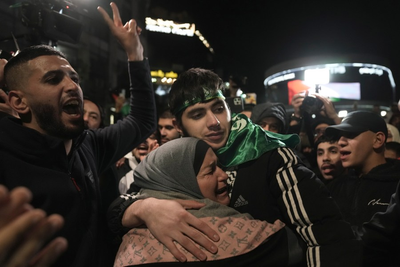
TEL AVIV, Israel (AP) — Israel and Hamas agreed to extend their cease-fire for two more days past Monday, the Qatari government said, bringing the prospect of a longer halt to their deadliest and most destructive war and further exchanges of Israeli hostages for Palestinians captured by Israel.
The announcement, made by Qatari Foreign Ministry spokesman Majid Al Ansary in a post on X, came on the final day of the original four-day truce between the warring sides. A fourth swap of hostages for prisoners under that deal was expected later Monday. Qatar, along with the United States and Egypt, has been the key mediator in the ongoing conflict between Israel and Hamas.
Israel has said it would extend the cease-fire by one day for every 10 additional hostages released. After the Qatari announcement, Hamas confirmed it had agreed to a two-day extension “under the same terms.”
But Israel says it remains committed to crushing Hamas' military capabilities and ending its 16-year rule over Gaza after its Oct. 7 attack into southern Israel. That would likely mean continuing their brutal bombings from devastated northern Gaza to the south, where hundreds of thousands of Palestinians have crammed into United Nations shelters, and where dire conditions persist despite the increased delivery of aid under the truce.
Israel will resume its attacks with “full force” as soon as the current deal expires if Hamas does not agree to further hostage releases, with the goal of eliminating the group and freeing the rest of the captives, government spokesperson Eylon Levy told reporters on Monday.
So far, 58 hostages have been released during the current truce, including 39 Israelis. Before the truce, four hostages were freed, another rescued and two were found dead inside Gaza.
After weeks of national trauma over the around 240 people abducted by Hamas and other militants, scenes of the women and children reuniting with families have rallied Israelis behind calls to return those who remain in captivity.
On Sunday, Hamas freed 17 hostages, including 14 Israelis, and Israel released 39 Palestinian prisoners — the third such exchange under the truce.
So far, 19 people of other nationalities have been freed during the truce, mostly Thai nationals. Many Thais work in Israel, largely as farm laborers.
The Palestinian prisoners released were mostly teenagers accused of throwing stones and firebombs during confrontations with Israeli forces, or of less-serious offenses. Many Palestinians view prisoners held by Israel, including those implicated in attacks, as heroes resisting occupation.
The freed hostages have mostly stayed out of the public eye, but details of their captivity have started to trickle out.
More than 13,300 Palestinians have been killed since the war began, roughly two thirds of them women and children, according to the Health Ministry in Hamas-ruled Gaza, which does not differentiate between civilians and combatants. More than 1,200 people have been killed on the Israeli side, mostly civilians killed in the initial attack. At least 77 soldiers have been killed in Israel’s ground offensive.
The calm from the truce allowed glimpses of the destruction wreaked by weeks of Israeli bombardment that leveled entire neighborhoods.
Footage showed a complex of several dozen multi-story residential buildings that had been pummeled into a landscape of wreckage in the northern town of Beit Hanoun. Nearly every building was destroyed or severely damaged, some reduced to concrete frames half-slumped over. At a nearby U.N. school, the buildings were intact but partially burned and riddled with holes.
The Israeli attacks has driven three-quarters of Gaza’s population from their homes, and now most of its 2.3 million people are crowded into the south. More than 1 million are living in U.N. shelters. The Israeli military has barred hundreds of thousands of Palestinaisn who fled south from returning north.
The U.N. says the truce made it possible to scale up the delivery of food, water and medicine to the largest volume since the start of the war. But the 160 to 200 trucks a day is still less than half what Gaza was importing before the fighting, even as humanitarian needs have soared.
___
Full AP coverage at https://apnews.com/hub/israel-hamas-war